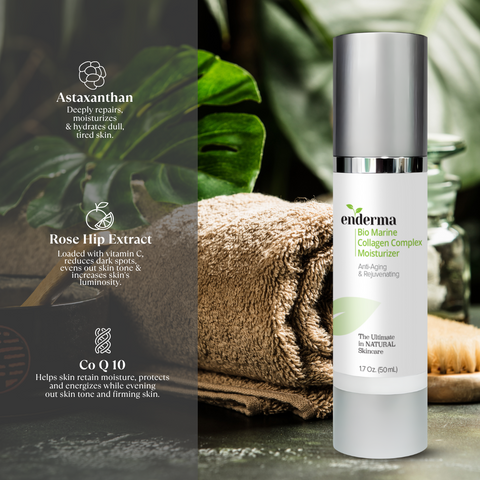The thyroid gland is located in the front of the neck, just below the Adam's apple (or laryngeal prominence). It is butterfly-shaped and consists of two lobes, one on each side of the windpipe (trachea), connected by a narrow band of tissue called the isthmus. The thyroid gland plays a crucial role in regulating various bodily functions by producing and releasing thyroid hormones. These hormones, namely thyroxine (T4) and triiodothyronine (T3), help control metabolism, energy levels, and numerous other physiological processes in the body.
Thyroid disorders, such as hypothyroidism, can lead to various changes in the body's normal functions. One of the common symptoms of hypothyroidism is dry skin and hair with excessive hair shedding and oftentimes hair loss. This occurs due to several reasons:
Combatting dry skin associated with thyroid conditions often involves a combination of medical treatment and skincare practices. Here are some tips that may help:
1. Consult a Healthcare Professional: If you suspect that your dry skin is related to a thyroid condition, it's crucial to consult with a healthcare professional. They can provide an accurate diagnosis and recommend appropriate treatment options.
2. Thyroid Medication Management: Ensure that you are taking your prescribed thyroid medication as directed by your healthcare provider. Properly managing your thyroid levels can help alleviate symptoms, including dry skin.
3. Hydration: Staying well-hydrated is important for overall skin health. Drink an adequate amount of water each day to help keep your skin hydrated from the inside out.
4. Use a Humidifier: Adding a humidifier to your living space can help maintain moisture levels in the air, which can prevent your skin from drying out.
5. Gentle Cleansing: Use mild, fragrance-free cleansers that are designed for sensitive or dry skin. Avoid harsh soaps and hot water, as they can strip natural oils from your skin.
6. Moisturize Regularly Apply a hypoallergenic and fragrance-free moisturizer immediately after showering or bathing, while your skin is still slightly damp. This helps lock in moisture.
7. Avoid Harsh Skincare Products: Avoid products with alcohol, fragrance, or other harsh chemicals, as they can further irritate dry skin. Opt for products labeled as hypoallergenic and non-comedogenic. Enderma brand skin care was made specifically for patients with Endocrine skin. Enderma is scientifically and thoughtfully created with ingredients that won't cause cancer which is great for thyroid patients who've had thyroid cancer.
8. Limit Bath/Shower Time: Long, hot showers or baths can strip your skin of its natural oils, exacerbating dryness. Aim for shorter, lukewarm baths or showers.
9. Exfoliate Gently: Use a gentle exfoliating product once or twice a week to remove dead skin cells. Avoid harsh scrubs, as they can irritate already sensitive skin.
10. Protect Your Skin: In cold or windy weather, wear appropriate clothing like scarves and gloves to shield your skin from the elements.
11. Diet and Supplements: Ensure you have a balanced diet rich in vitamins and minerals that support skin health. Omega-3 fatty acids (found in fatty fish, flaxseeds, and walnuts) can be particularly beneficial. If necessary, talk to your healthcare provider about appropriate supplements.

12. Avoid Irritants: Steer clear of products or substances that may irritate your skin, such as harsh detergents, strong fragrances, or excessive sun exposure.
13. Pat, Don't Rub: When drying off after a shower or bath, pat your skin gently with a soft towel rather than rubbing vigorously.
14. Regular Monitoring and Adjustments: Keep regular follow-up appointments with your healthcare provider to monitor your thyroid levels and make any necessary adjustments to your treatment plan.
As we mentioned above your diet and choice of supplements can play a big role in supporting skin and hair health. In fact most people who take ThyVita brand supplements have stated their excess hair shedding stopped and their hair, eyelashes and eyebrows grew back.
Vitamin supplements can help improve dry skin and hair by providing essential nutrients that support overall health and promote proper functioning of the skin and hair cells. But it's important to take a supplement with higher bioavailability so you can see and feel the difference. ThyVita brand supplements were created specifically for thyroid patients, with higher bioavailability and patented ingredients that bypass low stomach acid for better absorption.
Here are some key vitamins and minerals that are known to benefit skin and hair health and best of all these nutrients and more are included in our Women's Ultra and Vitality formulas:
1. Vitamin A: This vitamin is crucial for skin health. It supports the production of sebum, which is the skin's natural oil, helping to keep it moisturized. Additionally, vitamin A plays a role in cell production and repair, which is essential for maintaining healthy skin and hair.
2. Vitamin C: Vitamin C is an antioxidant that helps protect the skin from damage caused by free radicals. It's also important for collagen production, which is vital for skin elasticity and preventing dryness.
3. Vitamin E: Another powerful antioxidant, vitamin E helps protect the skin from damage caused by UV rays and environmental pollutants. It also supports the skin's natural moisture barrier.
4. Vitamin D: This vitamin plays a role in skin cell growth, repair, and metabolism. It helps support the immune system, which indirectly affects skin health.
5. Vitamin B-complex (Biotin, B3, B6, B12)**: B vitamins play a crucial role in maintaining healthy skin and hair. Biotin, in particular, is well-known for its benefits to hair and nails. B vitamins help convert food into energy and support the health of skin cells.
6. Omega-3 Fatty Acids: While not a vitamin, omega-3 fatty acids are essential for skin health. They help maintain the skin's lipid barrier, which retains moisture and keeps the skin hydrated.
7. Zinc: This mineral is essential for skin health as it helps with cell production, inflammation reduction, and overall skin repair. It's particularly important for people with inflammatory skin conditions.
8. Silica: Silica is a mineral that is essential for collagen production. Collagen is crucial for skin elasticity and hydration.
9. Iron: Iron is essential for carrying oxygen to cells, including those in the skin. Without sufficient iron, the skin may become pale, dry, and lackluster.
Conclusion
It's important to note that while supplements can be beneficial, a balanced diet rich in fruits, vegetables, lean proteins, and whole grains is the best way to obtain these nutrients naturally. Additionally, it's wise to consult with a healthcare professional before starting any new supplement regimen, as excessive intake of certain vitamins and minerals can have adverse effects. They can provide personalized advice based on your specific needs and circumstances.
Remember, it's important to consult with a healthcare professional for personalized advice and treatment options tailored to your specific situation. They can provide the most accurate guidance based on your individual needs and the severity of your dry skin.


